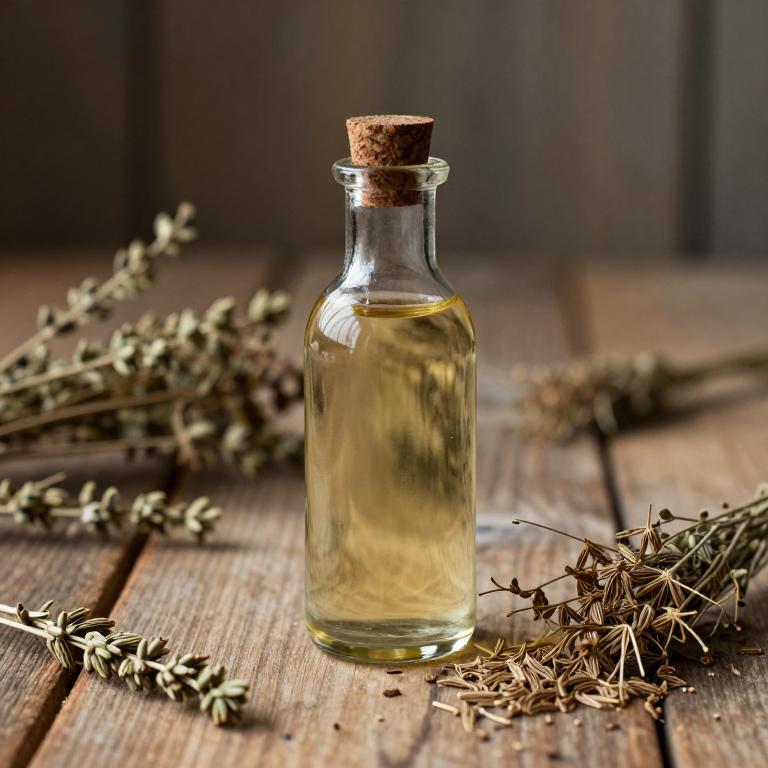10 Best Herbal Syrups For Hyperacidity

Herbal syrups for hyperacidity are natural remedies that aim to soothe excess stomach acid and promote digestive comfort.
These syrups typically contain ingredients like licorice root, fennel, and ginger, which are known for their anti-inflammatory and carminative properties. They work by neutralizing stomach acid, protecting the stomach lining, and reducing symptoms such as heartburn and indigestion. Many herbal syrups are preferred over conventional medications due to their fewer side effects and gentle action on the body.
However, it is important to consult a healthcare professional before using them, especially if symptoms persist or are severe.
Table of Contents
- 1. Cumin (Cuminum cyminum)
- 2. Licorice (Glycyrrhiza glabra)
- 3. Fennel (Foeniculum vulgare)
- 4. Ginger (Zingiber officinale)
- 5. Peppermint (Mentha piperita)
- 6. Black pepper (Piper nigrum)
- 7. Thistle (Silybum marianum)
- 8. Marshmallow (Althaea officinalis)
- 9. Dog rose (Rosa canina)
- 10. Chaste tree (Vitex agnus-castus)
1. Cumin (Cuminum cyminum)

Cuminum cyminum, commonly known as cumin, is often used in herbal syrups to alleviate symptoms of hyperacidity due to its soothing and anti-inflammatory properties.
These syrups typically combine cumin with other herbs like licorice, ginger, and cardamom to enhance their effectiveness in reducing excess stomach acid. The active compounds in cumin, such as cuminaldehyde and thymol, help neutralize acid and protect the stomach lining. Herbal syrups made from cumin are generally considered safe for long-term use, though they should be taken under the guidance of a healthcare professional.
They are a natural alternative for individuals seeking relief from hyperacidity without the side effects of conventional antacids.
2. Licorice (Glycyrrhiza glabra)

Glycyrrhiza glabra, commonly known as licorice root, has been traditionally used in herbal medicine for its soothing effects on the digestive system.
Licorice root syrup is often prescribed for hyperacidity due to its ability to neutralize excess stomach acid and protect the stomach lining. The active compounds, such as glycyrrhizin and flavonoids, exhibit anti-inflammatory and antacid properties that help reduce irritation and inflammation in the gastrointestinal tract. However, prolonged use of licorice root syrup can lead to side effects like hypertension and potassium loss, so it should be used under medical supervision.
Despite these considerations, it remains a popular and effective herbal remedy for managing symptoms of hyperacidity when used appropriately.
3. Fennel (Foeniculum vulgare)

Foeniculum vulgare, commonly known as fennel, is traditionally used in herbal medicine to alleviate symptoms of hyperacidity due to its carminative and antispasmodic properties.
Fennel herbal syrups are often prepared by infusing the dried seeds in a base of honey or glycerin, allowing the active compounds like anethole and fenchone to be readily absorbed. These syrups are believed to neutralize excess stomach acid and soothe the digestive tract, making them a popular remedy for indigestion and heartburn. The mild, licorice-like flavor of fennel syrup makes it palatable and easy to consume regularly.
While generally safe, individuals with allergies to related plants or those on certain medications should consult a healthcare provider before use.
4. Ginger (Zingiber officinale)

Zingiber officinale, commonly known as ginger, has been widely used in traditional medicine for its soothing properties, particularly in managing hyperacidity.
Ginger herbal syrups are prepared by extracting the active compounds from fresh or dried ginger root and combining them with natural sweeteners and other herbs to create a palatable remedy. These syrups work by reducing excess stomach acid through their anti-inflammatory and carminative effects, which help alleviate symptoms like heartburn and indigestion. The warming properties of ginger also stimulate digestion and ease gastrointestinal discomfort.
Regular consumption of ginger herbal syrup, under the guidance of a healthcare provider, can be a beneficial complementary therapy for individuals suffering from hyperacidity.
5. Peppermint (Mentha piperita)

Mentha piperita, commonly known as peppermint, is often used in herbal syrups to alleviate symptoms of hyperacidity due to its soothing and anti-inflammatory properties.
These syrups work by relaxing the smooth muscles of the digestive tract, which can help reduce the sensation of burning and discomfort associated with excess stomach acid. The menthol in peppermint also has a cooling effect that may help neutralize acid and provide relief from heartburn and indigestion. Herbal syrups containing peppermint are typically prepared with honey or other natural sweeteners, making them a palatable and gentle option for long-term use.
However, individuals with certain medical conditions or those taking specific medications should consult a healthcare provider before using peppermint-based remedies.
6. Black pepper (Piper nigrum)

Piper nigrum, commonly known as black pepper, has been traditionally used in herbal medicine for its potential benefits in managing hyperacidity.
The active compound, piperine, is believed to enhance the production of digestive enzymes and stimulate the secretion of saliva, which can help neutralize excess stomach acid. Herbal syrups made from black pepper are often prepared by combining the dried fruit with honey or other natural sweeteners, making them easier to consume. These syrups are thought to provide a gentle yet effective way to alleviate symptoms such as heartburn and indigestion.
However, it is important to consult with a healthcare professional before using black pepper syrups, especially for individuals with existing gastrointestinal conditions or those taking medications.
7. Thistle (Silybum marianum)

Silybum marianum, commonly known as milk thistle, is traditionally used in herbal medicine for its potential benefits in supporting liver health.
While primarily recognized for its hepatoprotective properties, some herbal syrups containing Silybum marianum may be marketed for digestive support, including alleviating symptoms of hyperacidity. These syrups typically contain standardized extracts of the plant's seeds, which are believed to possess anti-inflammatory and antioxidant properties. However, it is important to note that scientific evidence directly linking Silybum marianum to the treatment of hyperacidity is limited, and individuals should consult with a healthcare provider before using such products.
As with any herbal remedy, the effectiveness and safety can vary, and it should not replace conventional medical treatments for hyperacidity.
8. Marshmallow (Althaea officinalis)

Althaea officinalis, commonly known as marshmallow root, has been traditionally used in herbal medicine for its soothing properties, particularly in the form of syrups.
These syrups are often employed to alleviate symptoms of hyperacidity due to their mucilaginous content, which forms a protective layer over the mucous membranes of the digestive tract. The presence of mucilage helps to neutralize excess stomach acid and reduce irritation, making it a popular natural remedy for heartburn and indigestion. Althaea officinalis syrups are generally considered safe for most adults and can be used as a complementary therapy alongside conventional treatments.
However, it is advisable to consult a healthcare professional before using these syrups, especially for individuals with underlying health conditions or those taking other medications.
9. Dog rose (Rosa canina)

Rosa canina, commonly known as rosehip, is a traditional herbal remedy that has been used for centuries to support digestive health.
Rosa canina herbal syrups are made from the dried fruits of the rose plant and are rich in vitamin C, antioxidants, and essential oils, which may help reduce inflammation and soothe the digestive tract. These syrups are often recommended for individuals suffering from hyperacidity due to their ability to neutralize excess stomach acid and protect the stomach lining. The natural compounds in rosehip can also promote the production of protective mucus in the stomach, offering relief from symptoms such as heartburn and indigestion.
When used as part of a holistic approach, rosa canina syrups may provide a gentle and effective way to manage hyperacidity naturally.
10. Chaste tree (Vitex agnus-castus)

Vitex agnus-castus, commonly known as chaste tree, has been traditionally used in herbal medicine for its potential benefits in managing hyperacidity.
Herbal syrups made from Vitex agnus-castus are believed to support digestive health by regulating stomach acid production and reducing inflammation in the gastrointestinal tract. These syrups may help alleviate symptoms such as heartburn, indigestion, and bloating associated with hyperacidity. The active compounds in Vitex, such as flavonoids and iridoids, are thought to have soothing and anti-inflammatory properties.
However, it is important to consult with a healthcare professional before using these syrups, especially if you are on medication or have underlying health conditions.